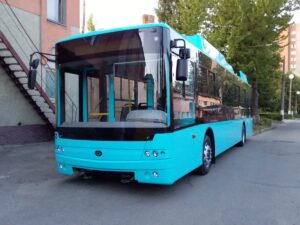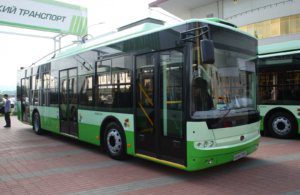
The European Bank for Reconstruction and Development (EBRD) is lending EUR10.6 million to the municipal enterprise (CE) Electrotrans (Khmelnitsky) to finance the purchase of new trolleybuses, as well as equipment for maintenance and diagnostics, according to a press release from the bank.
The EBRD loan is part of a financing package that also includes investment grants from the EU Neighbourhood Investment Platform of up to EUR2.75 million and up to EUR1.7 million from the EBRD’s Special Crisis Response Fund, which receives a contribution from the U.S. government, according to the statement Friday.
The loan and grants will be used to purchase new trolleybuses with remote monitoring systems, spare parts and service equipment.
In turn, the city will cover the cost of installing surveillance cameras inside the trolleybuses and upgrading the trolleybus stops, traction substations and trolleybus depot in the amount of EUR1.5 million.
The press release reminds us that the project is part of the EBRD’s Green Cities program, which Khmelnitsky joined in 2019. The first project, signed in October 2020, concerned improving solid waste management.
“Both projects are extremely important to the residents of Khmelnitsky: the ongoing project – to improve solid waste management – and the project to purchase new trolleybuses. We are glad that we can implement them exactly with the EBRD, our long-term partner, despite the war caused by Russian aggression,” the press service quotes Khmelnitsky Mayor Alexander Simchyshyn, who represented the city in Warsaw at the signing of the agreement with EBRD Managing Director for Sustainable Infrastructure Development Nandita Parshad.
As reported, earlier Simchyshyn noted that up to 45 low-floor trolleybuses are planned to buy with EBRD funds and grants, but at the same time, their number will depend on the cost of trolleybuses, which has increased.
The EBRD press service states that after the full-scale invasion of Ukraine by Russia, Khmelnytskyi faced a large flow of internally displaced persons (IDPs), which put a strain on city services.
The EBRD resumed work with Khmelnitsky in June, adding an IDP needs assessment to the Green City Action Plan, with funding provided by the Swedish government.
The EBRD’s Green Cities program was founded in 2016. Since then, it has helped more than 50 cities on three continents, with more than EUR5 billion spent on its support.
In Ukraine, Lviv, Kiev, Kryvyi Rig, Dnipro, Khmelnitsky joined it, among others.
As it was reported, the EBRD together with donors undertook to provide financing in the amount of EUR3 billion for support of functioning of business and economy in Ukraine in 2022-2023. In 2022, the bank allocated EUR1.7bn to support Ukraine and attracted EUR200m from partner financial institutions.

The European Bank for Reconstruction and Development (EBRD) under the Ukraine Public Transport Framework project to improve public transport infrastructure signed four loan agreements worth EUR 38 million in total with trolleybus utilities of Mariupol, Kryvy Rih, Kharkiv, and Zhytomyr in January-November 2018 against municipal guarantees.
In particular, it signed a EUR 13 million agreement with municipally owned Mariupol Tram and Trolleybus Administration in July, while agreements worth at EUR 8 million each was signed in September with municipally owned Urban Trolleybus (Kryvy Rih) and municipally owned Trolleybus Depot No. 2 (Kharkiv). Late in November, the EBRD signed an agreement with municipally owned Zhytomyr Tram and Trolleybus Administration to the tune of EUR 9 million.
Under the project, the loans are additionally backed by EBRD loans from the Clean Technology Fund (CTF) and grants from the Eastern Europe Energy Efficiency and Environment Partnership (E5P).
According to the Antimonopoly Committee of Ukraine, in the case of Kryvy Rih, the city provided a guarantee for EUR 10 million, as the bank gives its municipal enterprise an additional EUR 2 million loan from the Clean Technology Fund. CTF loans for Mariupol and Kharkiv also accounted to EUR 2 million.
The loans are issued for 12 years with repayment in equal parts every six months after a two-year grace period.
Kryvy Rih’s interest rate on principal debt is set at 5.75% and is pegged to the rate of 6-month Euribor rate with the possibility of lowering. It depends on the city’s rating and the borrower’s compliance with the required financial ratios. At the same time, the rate for a CTF loan is only 0.75%.